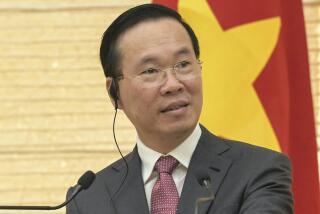Hong Kong Leader Asks for Second Chance
- Share via
HONG KONG — Beleaguered Hong Kong leader Tung Chee-hwa admitted Thursday that he had made mistakes and asked citizens for a second chance, after mass protests over a national security bill stirred the territory’s biggest crisis since its hand-over to China in 1997.
Tung ruled out resigning, however, as demanded by critics who said the proposed anti-subversion law was an assault on freedoms of speech, press and assembly that could introduce mainland-style suppression.
Tung’s opponents immediately voiced doubts about whether the unpopular chief executive could truly reform and regain credibility.
Beijing has stayed largely silent on the volatile situation -- which exploded anew Wednesday night with the resignations of Tung’s security and finance chiefs.
The territory’s mini-constitution guarantees Hong Kong citizens Western-style civil liberties unheard of in mainland China, but it also requires the anti-subversion legislation that stirred the crisis.
After half a million people marched in Hong Kong on July 1 to protest the bill, Tung was forced into an embarrassing series of retreats. The legislation is now on hold.
Tung’s news conference Thursday appeared aimed partly at dispelling speculation that he might soon quit, but he also said he wanted a fresh start after being chastened by protests.
“In the past six years, I have made mistakes,” he said. “I understand people’s criticisms and discontent toward me. But faced with such criticisms, what should my attitude be? I think I should actively face them and make improvements.”
Tung, who was not popularly elected, is heading to Beijing on Saturday to brief his bosses on the crisis, which has thrust Hong Kong and China into uncharted political territory.
The anti-subversion bill would outlaw such crimes against the state as sedition and treason and impose life sentences for some offenses. The opposition said the government sought to push it through without adequately consulting the people.
Lawmaker Margaret Ng, a government critic, said it would take more than words for Tung to overcome his “blind spots” toward public opinion.
“I think it would be very, very difficult for him to change, and if he is bad for Hong Kong, we really have to let him go,” Ng said.
Critics say that Tung has lost the ability to govern but that Chinese authorities are unlikely to seek his removal.
More to Read
Sign up for Essential California
The most important California stories and recommendations in your inbox every morning.
You may occasionally receive promotional content from the Los Angeles Times.













